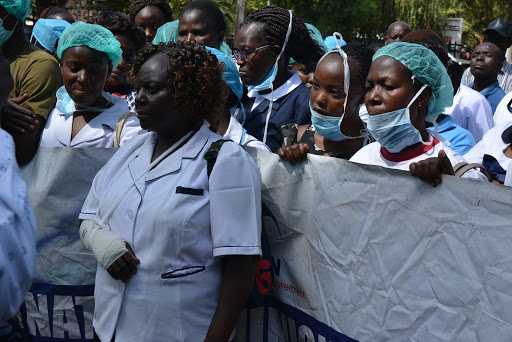 Exhausted nurses at a meeting during the Covid-19 pandemic period.
Exhausted nurses at a meeting during the Covid-19 pandemic period.She has been on her feet for nearly 12 hours. “Sometimes I just want to disappear for a week,” she says.
Grace was among 308 KNH nurses interviewed recently about burnout at work. They care for thousands but are themselves running on empty.
The Ministry of Health and Jomo Kenyatta University of Agriculture and Technology (JKUAT), which jointly published the findings, revealed that most nurses at the hospital report complete burnout.
Marriage, often assumed to be a source of emotional support, is one of the strongest predictors for female nurses.
The findings were published in the Open Journal of Epidemiology in August. They showed that more than half (52.9 per cent) of nurses at KNH suffer emotional exhaustion, 58.1 per cent show signs of cynicism, and 39.6 per cent report a reduced sense of personal accomplishment.
“Individuals who are married have 2.31 times higher odds of experiencing emotional exhaustion compared to those who are not married. This relationship is statistically significant,” the authors said.
They suggested that the constant balancing act between demanding shifts and domestic expectations intensifies stress and fatigue.
That is because for many Kenyan female nurses, responsibilities do not end when hospital shifts do. The result is a cycle of chronic overwork, little rest, and creeping emotional detachment.
The study also highlights the hospital’s relatively young and inexperienced nursing staff. Nearly three in every four KNH nurses (74.7 per cent) are under 40, and more than half (58.8 per cent) have worked there for less than five years.
That means many are still learning to navigate high patient loads, life-and-death emergencies, and long night shifts at Kenya’s busiest referral facility.
The authors cautioned that while younger nurses often bring energy and passion, they are also more susceptible to emotional exhaustion.
“Some scholars contend that younger nurses, especially those in their first years of service, are more susceptible to emotional exhaustion and depersonalization, especially in under-resourced and high-pressure environments typical of tertiary care facilities in Kenya,” they said.
The study was led by Mwakondja Alisa Jeomba, an environmental health practitioner linked to Jkuat.
It is titled, “Individual Factors Influencing Occupational Burnout among Nurses at Kenyatta National Hospital, Nairobi, Kenya.”
The findings echo global trends. Globally, burnout symptoms among nurses were reported at a rate of 11.23 per cent in 2024, with significant variations across different geographical regions. The sub-Saharan African region exhibits the highest prevalence of burnout symptoms, while the Europe and Central Asia regions have the lowest.
Jeomba’s team also found that lifestyle choices mattered, too. Smokers were five times more likely to experience emotional exhaustion, while regular exercise proved protective.
Those who worked out regularly had just one-sixth the odds of emotional exhaustion compared to those who did not.
Burnout manifests as fatigue, irritability, or emotional
numbness. Fatigued staff are more likely to make errors, take sick leave, or
quit altogether, the authors explained.
At KNH, most nurses (98 per cent) reported taking only one annual leave a year, and 15 per cent work more than 40 hours weekly. The study observes that resource constraints, patient acuity, and high patient volumes can drive rapid burnout.
The authors recommended flexible scheduling for married staff, gender-responsive stress-management training, and culturally sensitive spiritual support. They also urged hospital leaders to integrate wellness initiatives such as exercise programmes and smoking cessation support.
“The Ministry of Health should mandate hospital psychological support systems, allocate resources fairly to decrease burden, and include burnout evaluations in occupational health policy,” they said.
Grace said she often feels she has nothing left to give. “You come home too tired to talk,” she said. “Then you’re called back because someone else didn’t report.”















